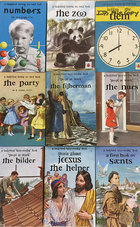
Ladybird has been producing familiar and much-loved children’s books for many decades, and most recently it has become best known for its novelty titles such as The Mid-Life Crisis, Dating and The Ex. However, in the early 1960s, Ladybird was well-known for a different trend: it took the decision to print many of its titles using ‘ita’ – the Initial Teaching Alphabet.
 Ita was a device introduced into many British schools in 1961, later spreading to the USA and Australia. It was, essentially, a variant on the alphabet created with the intention of helping English-speaking children to learn to read easily and quickly. Interestingly, ita was the invention of Sir James Pitman, grandson of Sir Isaac Pitman who invented Pitman’s shorthand – another man ostensibly concerned with speed.
Ita was a device introduced into many British schools in 1961, later spreading to the USA and Australia. It was, essentially, a variant on the alphabet created with the intention of helping English-speaking children to learn to read easily and quickly. Interestingly, ita was the invention of Sir James Pitman, grandson of Sir Isaac Pitman who invented Pitman’s shorthand – another man ostensibly concerned with speed.
Register now to continue reading
Thank you for visiting Nursery World and making use of our archive of more than 35,000 expert features, subject guides, case studies and policy updates. Why not register today and enjoy the following great benefits:
What's included
-
Free access to 4 subscriber-only articles per month
-
Unlimited access to news and opinion
-
Email newsletter providing activity ideas, best practice and breaking news
Already have an account? Sign in here









